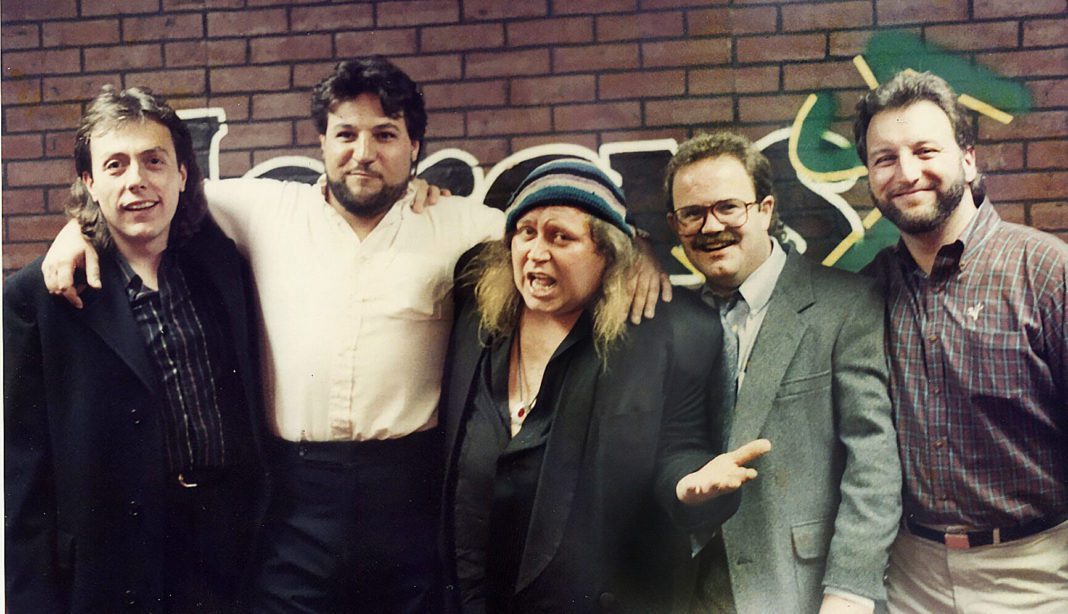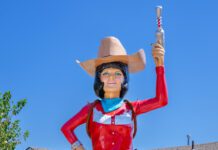Ask the veteran Tulsa broadcaster Mel Myers what he’s doing in his recently acquired gig as the morning man for radio station KBEZ (92.9 FM), aka The Drive, and he’s likely to tell you that he’s selling memories.
“On the surface, that sounds kind of cold and mercenary – the selling part,” he says. “But what I’m delivering, I hope, is good memories of people’s lives, while at the same time living in the present.”
And the reason he can do both of those things, he believes, is because the classic hit songs that make up his playlists have “stayed relevant.”
“When I play Led Zeppelin’s ‘Immigrant Song,’ I might be bringing back memories for people who were seniors in high school when Led Zeppelin III came out [in 1970]. But at the same time, I’m bringing back memories for anyone who saw and enjoyed the [2017] Thor: Ragnarok movie.
“My grandson Cash, who’s ten, was wanting me to show him some things on guitar, and one of the songs he wanted to learn was ‘Immigrant Song.’ And I’m like, ‘You’re ten years old, dude. What’s your point of reference for this song?’ And it was Thor: Ragnarok.”
This, Myers points out, is hardly an isolated case.
“I was at a movie a few weeks ago, and a bunch of songs on our 92.9 playlist were in the trailers for upcoming movies. There was one movie where they played a huge chunk of ‘Sweet Dreams’ by the Eurythmics. No voiceovers or anything, just the song accompanying the scenes.
“This music is still viable,” he concludes. “There are still successful radio stations all over the country playing it, and a lot of it is because it’s still being licensed for commercials and movies. So that’s kind of facilitated what I hope I’m doing, connecting with people in the morning.”
Myers has been connecting with Tulsa-area radio listeners for nearly 45 years now, his rich and resonant baritone one of the familiar voices on the soundtracks of our lives. He moved to northeastern Oklahoma in June of ’77, following a stint as a morning jock and program director in Fort Smith, Ark.
Phil Stone, later to serve a legendary stretch with partner Brent Douglas at Tulsa’s KMOD (97.5 FM), was his afternoon man in Arkansas; Myers got his first local attention with that same station, serving as KMOD’s midday deejay as well as its production director. During this time, he and fellow broadcaster Dave Michaels, aka Wavy Davy, would become familiar voices on radio spots for rock acts coming to town, especially those appearing at the Cain’s Ballroom, putting him on the ground floor at an exciting time for live music.
“I met the Police backstage when they were traveling in a van,” he recalls. “And KMOD sold tickets [to their Cain’s show] for 97 cents. They gave out police whistles as promotional material; I’ve still got one somewhere. And Pat Benatar – she’s the reason my right ear rings worse than my left, because I got up there to take a look at her and stood, stupidly, right next to the P.A. Both my ears ring – the right ear’s worse. Thanks, Pat.”
Myers stayed with KMOD for a half-dozen years, moving to KELI, the AM/FM station then known as 14K and 92K. He did a short stretch of morning work there, but it wasn’t until he moved to KMYZ (104.5 FM), aka Z104.5, in the late ’80s that he settled into the position.
“Z104.5 was probably where I made my name here in town as a morning guy,” he says. “The best years of it was when we had the ‘Banana and Mel in the Morning’ program in the early ’90s.”
Both with and without Banana (Brad Farnsworth), Myers spent a good long time on the air with Z104.5. And his tenure as a morning-drive jock there prepared him well for his current gig, which came along when his longtime friend and fellow air personality Dave Michaels contacted him from 92.9, where Michaels was program director. He told Myers that their morning man had just quit and asked if he wanted the job.
“But what I’m delivering, I hope, is good memories of people’s lives, while at the same time living in the present.”
Myers, who’d been doing a lot of radio-production work as well as fill-in gigs on various stations – among other things – had a one-word answer: no.
“He asked me if I’d just fill in, then, and I said, ‘Well, I don’t even want to do that, but I’ll do it for a little while, since you need me and you’re my buddy.’ At the time he called, I hadn’t done mornings for maybe over ten years.
“But once I got in there – I don’t want to downplay how excruciatingly hard it is to get up in the morning, but I will say I’d done it enough that I knew how to do it. The awful part is the early hours, but I realized the ownership, the management, was doing it more the old way than anybody else in town. It was a different atmosphere, and the difference is that the people who own the station live here. In Fort Smith, I’d experienced that, but the whole time I’d worked here [in Tulsa], until I started with Griffin [Communications, 92.9’s owner], I’d worked only for companies that were owned out-of-state.
“Radio in general is just a bunch of chains, really, ownership chains, and everybody wants to make money. But Griffin, I find, cares about the people. Everybody cares about the money, everybody cares about the advertisers. But Griffin realizes, more than some do, is that your ultimate customer is the listener.”
That’s something Myers understands as well – even as he deals with the myriad of changes that have come along in radio in the decade-plus he’s been away from the morning microphone.
“You know,” he says, “the biggest change is actually in the control room. It used to be such a hyperactive job. In the Banana and Mel days, he and I would be in there, and if a song was playing, we might be answering the phone, or doing a birthday-wakeup call that we’d need to edit a little before we aired it. Or I might be editing something else that’d be going on the air in 45 minutes.
“Back in those days, you had to trigger every song and every commercial. You had to listen to the end of each commercial so you could start the next one, and it required a ton of attention. It was a juggling act. All morning long, you were keeping those plates spinning on those sticks. It was bam, bam, bam, nonstop activity from the moment you hit the door to the moment you walked out – and even beyond, sometimes, if the phones were still ringing. It required attention. It required focus. It was like you were riding a wild horse, just trying to keep up.
“Now,” he adds, “so much of the job is computerized that it’s a little laxer in the room.”
He’s quick to say, however, that “laxer” isn’t necessarily a bad thing.
“The goodness of that is it lets me plan my next break and make sure I communicate what I hope to communicate,” he explains. “Doing the program itself is easy, because I’ve done it for so long it just kind of goes. But the preparation, to me, is the most important part. I try to figure out how I might relate the songs I have that morning to the audience, and I try to stay on top of fun things to do.
“So I hope I’m connecting with people in the morning. I hope I’m taking them back and making them feel good and maybe lightening their load a little bit – and helping them think about happy times.”


























